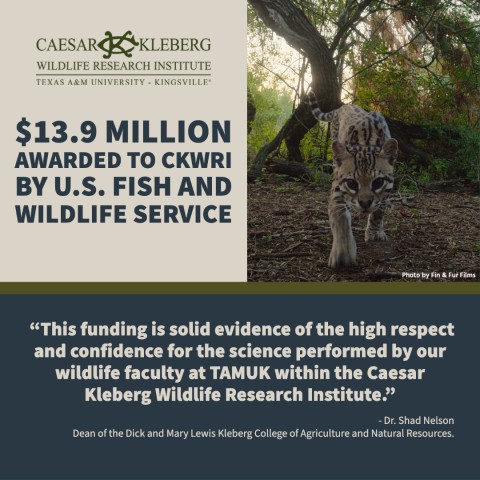
Texas A&M-Kingsville Receives Grants To Support Wildlife Conservation

KINGSVILLE (August 3, 2023) — Researchers with the Caesar Kleberg Wildlife Research Institute (CKWRI) at Texas A&M University-Kingsville have been awarded two contracts from the Department of the Interior’s U.S. Fish and Wildlife Service totaling nearly $14 million for ocelot conservation efforts and to research possible impacts of border barrier infrastructure construction on animal movements. This work is funded by U.S. Customs and Border Protection through an Interagency Agreement with the U.S. Fish and Wildlife Service.
“These contracts will help us conserve the unique wildlife we enjoy in Texas,” said David Hewitt, Executive Director of CKWRI. “This funding is timely and will provide the information necessary to manage these economically and ecologically important species.”
The larger of the two contracts, a $12.2 million award, will fund five years of ocelot research at the university, supporting the protection and recovery of the endangered wild cat in South Texas.
Dr. Lisanne Petracca, assistant professor of carnivore ecology, will work with a team of CKWRI scientists, including Dr. Michael Tewes, Regents professor and The Frank D. Yturria Endowed Chair in Wild Cat Studies, Dr. Clay Hilton, professor and wildlife veterinarian, Dr. Randy DeYoung, professor of wildlife genetics, and Dr. Alynn Martin, assistant professor of wildlife disease ecology and epidemiology.
“This funding opportunity presents an extraordinary opportunity to see the ocelot, a federally endangered species in the United States, achieve recovery in South Texas,” said Petracca. “We have put together an exceptionally talented team, from veterinarians to graduate students, dedicated to ensuring a future for this elusive cat.”
Petracca and CKWRI researchers will be working along with the East Foundation, Cincinnati Zoo & Botanical Garden, Texas A&M Natural Resources Institute, and Texas Parks and Wildlife Department on the project to improve the genetic composition of existing ocelot populations in Texas, build a new ocelot population in Texas, and guide thornscrub forest restoration to improve the quality and amount of habitat for ocelots in Texas.
The second awarded project, which Petracca is also a part of, is a $1.75 million contract that will support work assessing the effect of border barrier systems on U.S.-Mexico transboundary movements and population densities of large mammals inhabiting the border region of South Texas, focusing on black bears and mountain lions.
Petracca will work on the project with Dr. Michael Cherry, the Stuart W. Stedman Chair for White-tailed Deer Research, and Dr. Levi Heffelfinger, assistant professor of large mammal ecology, from CKWRI and scientists from Borderlands Research Institute at Sul Ross State University.
“We at CKWRI are incredibly fortunate to have the opportunity to study the habitat use and movements of mountain lions in the context of the border barrier system. The sky's the limit in terms of what we can achieve with this exciting new program,” Petracca said.
Both project teams will collaborate closely with the U.S. Fish and Wildlife Service and U.S. Customs and Border Protection as well as other key partners, including the government of Mexico, wildlife institutions and agencies within Mexico, the Texas Parks and Wildlife Department, various non-governmental organizations, and public and private landowners in South and West Texas.
“These two contracts that support wildlife conservation are not only historic but demonstrate just how unique and important South Texas lands are for wildlife habitat conservation of endangered species,” said Dr. Shad Nelson, Dean of the Dick and Mary Lewis Kleberg College of Agriculture and Natural Resources. “This funding is solid evidence of the high respect and confidence for the science performed by our wildlife faculty at TAMUK within the Caesar Kleberg Wildlife Research Institute.”
-TAMUK-